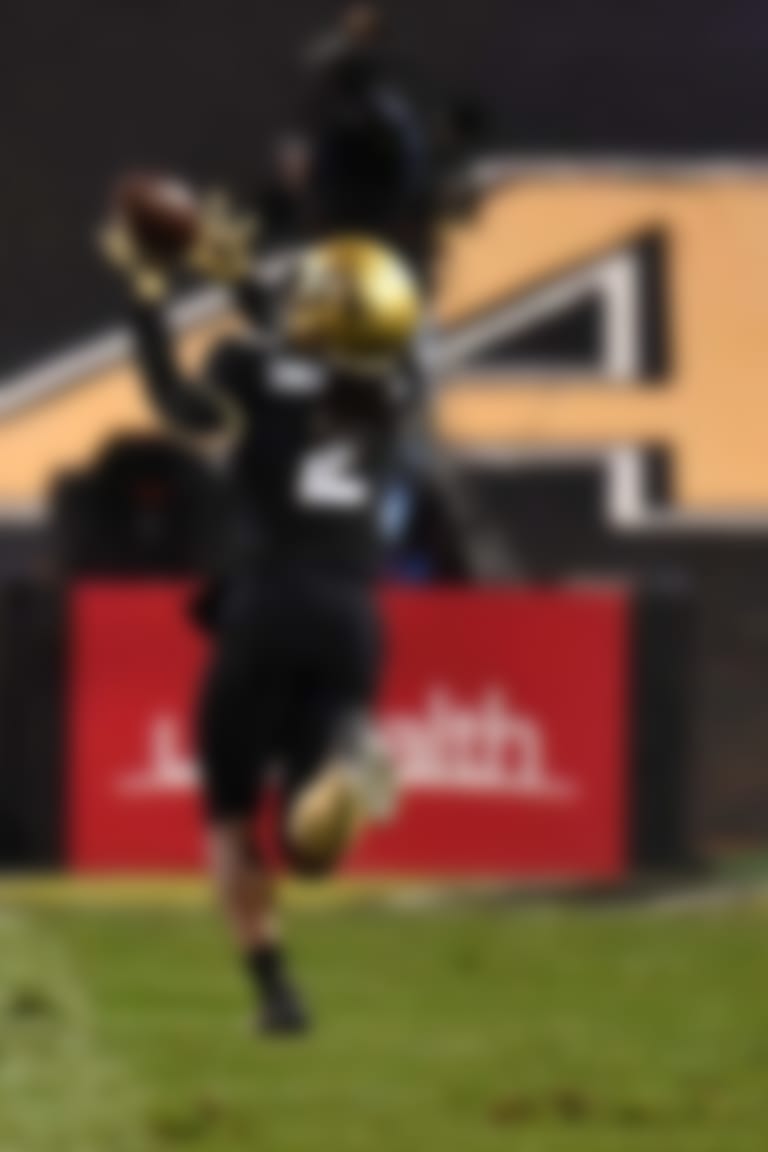After witnessing the accident that took his father's life, Laviska Shenault went into a deep recession. A decade later, the Colorado receiver can no longer hide.
By Chase Goodbread | Published Nov. 26, 2019
DESOTO, Texas -- His dreadlocks grew to obscure the name on the back of his jersey a long time ago, and now they're creeping down, encroaching over the top of the No. 2 on the back of his jersey. It's a highly coveted number among college football's multi-threat titans, its historical lineage including Deion Sanders, Charles Woodson and Cam Newton.
Laviska Shenault Jr. is a perfect torchbearer for it, as Colorado's do-everything offensive star. But as for the heaps of notoriety that come with combining a playmaker's number with the talent that number demands, he'd just as soon let those dreads grow down to cover that No. 2 altogether.
They just might.
He's continued to grow them in tribute to his father, Laviska Sr., who was killed under unspeakably tragic circumstances in 2009, when junior -- often called Viska for short -- was only 10. The salute was well-known at DeSoto High, in south Dallas, and now at CU, where the story behind his hair length is oft-asked and less often told. He prefers to let the dreadlocks speak for him as much as possible.
But it's the dreadlocks up front, the ones that drop down directly over his eyes, that seem to play an entirely different role. They obscure him just a bit, providing a barrier between privacy and priers, and he speaks from behind them as he sizes up the latest stranger to approach with an introduction. He seems wholly unbothered by their interference with his vision; in a 40-minute discussion at CU's practice facility, he never once pushes them to the side.
He'll be asked about the heartbreaking history behind his hair more and more when he eventually goes through the NFL draft interview process and pro scouts try to peel back a few of its layers. It won't be easy, but as the dynamically gifted receiver's profile has exploded since his breakout 2018 season, he's had to begin overcoming an understandable reclusiveness.
"Laviska has come a long, long way as far as talking," said his younger brother, CU freshman receiver La'Vontae Shenault. "With me, with family, with everyone period. He's come a long way."
Annie Shenault's apartment in DeSoto greets visitors with a doormat displaying three words:
Grateful
Thankful
Blessed
Somehow, she is all of them.
No words adequately convey the pain she took on after witnessing her husband die in a vehicle-pedestrian accident 10 years ago. If it could even be calculated, it would have to be multiplied by five -- the number of Shenault children in the car to witness the horrifying tragedy along with her.
Her memory of it comes in flashes. On July 17, 2009, the family was traveling in rainy conditions on Loop 12 in Irving, Texas, returning home late at night from a pool party. Laviska Sr. thought his wife was driving too slowly, so he asked Annie to pull over and let him take the wheel. She came to a stop on the southbound shoulder of Loop 12, on an unlit incline approaching the Trinity River Bridge, about 15 miles due east of what was, at the time, the Dallas Cowboys' newly constructed AT&T Stadium. Annie recalls her 39-year-old husband was wearing slides when he lost his footing on roadside gravel and stumbled into the road. An Acura swerved to avoid him, and hit him with only a glancing blow, but a silver Ford F-150 pickup, along with multiple other vehicles, followed and struck him fatally, sending him some 50 yards from the original point of contact, as estimated by police.
Annie is convinced the first collision was non-lethal.
"It swiped him and spun him around, and he was starting to get up," she recalled. "I tried to get out of the car and my door wouldn't open; I was grabbing at the handle so fast. By the time he started to stand, this truck comes and hit him straight on -- we saw him on the hood. It almost caused a big pile-up. You [remember] it in slow-motion. Big trucks were swerving, an SUV spun around when they saw him in the road."
In the backseat, one Shenault son, Calvin, pushed down the head of his youngest brother, 8-year-old La'Vontae, to prevent him from seeing what had happened. Laviska Jr., had been sitting in the front seat between his parents and witnessed it all.
Annie said the Acura never stopped. But time did.
The next thing, Annie recalls, she was on the ground and handcuffed by police because she was too hysterical for her own safety, temporarily detained at the scene while she tried to calm herself. According to police, she had to be stopped from running onto Loop 12 herself to be beside her husband's body. When she began to assess the trauma the children had just absorbed, four of them were "hollering and screaming," she said, as inconsolable as anyone would be at a moment like this.
The fifth, Laviska Jr., sat on the roadside with a blank stare, and nary a tear.
Like his mother, Laviska Jr. describes the scene as something of a blur and remembers little, repressing what he saw as a means of protecting himself from it. But he does recall being too stunned to react.
"I do remember that part," he said. "I'm not a crier. I'm not emotional at all. Everyone else was very emotional -- it was crazy."
Annie said Laviska was equally stoic at his father's memorial service, and she doesn't recall him crying at the funeral, either. She got only scattered pieces of indications from him that he was progressing through his grief, but never a full conversation.
Laviska began to withdraw from those around him, but as the quiet one in the family, it's not as if his personality bubbled beforehand. And now, faced with such devastating loss, he receded even further.
"I felt like I was in a black hole," he said.
A portable basketball goal that had once been pulled out on a regular basis for some highly competitive and physical Shenault family games now stood still, unused, serving as little more than a reminder of the man who first brought it home.
"He'd go to school, come home, eat, and go to his room," Annie said about Laviska. "Next day, same thing. It went on that way for a long time."
A large family portrait of the Shenault family overlooks the living room in Annie's upstairs apartment, and Laviska Shenault Sr.'s kid-like nature is evident from it. He and the children are donning Miami Dolphins jerseys, and a Dolphins cap sits on his head, backward.
There wasn't a more passionate Dolphins fan in Greenville, Mississippi, in the 1980s, when Laviska Sr., forged his fandom from the club's Dan Marino-era success. And even at 39, his emotions could get the best of him where the Dolphins were concerned. He'd play Madden NFL with his kids, always directing Miami, and would sometimes throw the controller if he lost. If the Dolphins lost on Sundays -- particularly against the Patriots, whom his son, Calvin, rooted for -- he could be difficult to be around.
Dad was at the center of competitive fun all over the house, whether organizing family basketball games or engaging in battles at home in which he and the kids would throw socks filled with various objects at one another, using furniture for cover. Laviska Jr., recalls a family water fight in the house -- with dad squarely in the center -- that escalated to full buckets being dumped on one another.
This was the enormity of the void he left behind: a provider but also a playmate; an authority but also an ally.
For years after his death, Annie avoided driving on Loop 12. And even now, she takes a deep breath when driving the stretch where the accident happened. The health insurance she had through her job as a customer service rep at Home Depot paid for three grief counseling sessions for her, and one for each of her kids. The only feedback Annie received from the therapist on Laviska wasn't very helpful.
"She talked to them maybe an hour, came out and just said they'd be OK," Annie said.
Annie knew better, but she couldn't financially afford more therapy. She took only three weeks off from work. As a newly widowed mother who now had to navigate a single-income family budget, a steady paycheck was paramount.
As bills mounted, so did the hurt.
The house was eerily quiet. Laviska Sr., had brought so much of its noise and energy, and now only a paralyzing silence was left in the void.
"I had to snap out of the daze, because I thought I was going to lose my boys, too, if I didn't," she said.
Annie worried most about La'Vontae, the youngest, who entered a rebellious stage in elementary school after his dad died. Now a freshman receiver at Colorado, La'Vontae had always carried much the opposite personality -- outgoing, emotional, and sometimes hard-headed -- as Laviska Jr. As such, his feelings about his father's death manifested themselves outwardly, sometimes troublingly so.
"I had to tell him one day, 'Vontae, nobody cares that you're sad today," Annie said. "I care, but the world doesn't care."
Meanwhile, Laviska Jr.'s quiet nature got even quieter. The Madden video game he used to play with his father was no place for him to escape. He confided more in his older sister, Nikki, than anyone else in the family. Signs of his emergence from sorrow were infrequent, hard to identify, and at times, barely noticeable.
"Because he was already so quiet, he didn't have a lot of friends anyway," said La'Vontae. "It was always a small circle for him."
But even those inside that circle aren't privy to Shenault's deepest thoughts about the accident. K.D. Nixon, one of his best friends and a teammate at both DeSoto and CU, said that horrifying night on Loop 12 rarely, if ever, comes up in conversation.
"I don't try to get into his business about that -- his goal is to do it for his family with his daddy watching over him. I don't want to cross any lines," Nixon said. "We talk about family some, but we stay on goals and stay off of boundaries."
Annie awoke one morning in the summer of 2012, tried to rise from bed to get ready for work, and fell straight to the floor without a step. She could not stand, and equally frightening, she had no idea why.
Her daughter, Tyanna, got her to Methodist Charlton Medical Center in Southwest Dallas and after a series of tests that went nowhere doctors determined she'd contracted West Nile Virus. Three years after her husband had tragically died, now her life was being threatened.
Hers was one of the earliest documented cases, among nearly 400, in a dangerous 2012 outbreak of the mosquito-borne disease that killed 20 people in the Dallas area. A public health emergency was declared, and despite concerns about the safety of chemical exposure, aerial insecticide spraying was approved to reduce the mosquito population.
"In school, everyone was wiping things down. People were buying up all the bottles of Off everywhere and mosquito trucks were driving around spraying everything," Laviska recalled. "It was all over the news. People were dying."
As the death count rose and concern over WNV began to grip his hometown, Laviska recessed even deeper into solitude.
"They were frightened, they were terrified," Annie said of her younger sons. "They had just lost their daddy and thought they were going to lose their momma, too. Junior always asked if I needed anything. I know he was scared. But at the same time, Junior started to feel like the man of the house."
Most who contract WNV feel no symptoms and never even know they have it. According to the Center for Disease Control, only about 1 in 150 cases result in life-threatening illness.
Annie wasn't among the fortunate 149.
In the more dangerous cases like hers, WNV attacks the central nervous system and can be fatal. There is no vaccine; all doctors can do is fight symptoms and keep the body flushed with fluids. Treatment is similar to flu regimens.
Annie's symptoms were downright bizarre, and some of them persisted for many months. Along with the leg weakness that required her to begin using a cane, she experienced dry mouth and difficulty chewing and swallowing. It disrupted her equilibrium, causing her to have to sit down sometimes after taking just a few steps. She was in the hospital for weeks, bed-ridden for months, and needed constant home care. She didn't feel completely normal again for almost a year. The last symptom to leave her was random flashes of visual impairment during which she would intermittently see black spots.
While the virus eventually left Annie's body, it left behind a more lasting -- and devastating -- financial impact. Laviska Sr.'s death reduced the Shenaults from a two-income family to one. WNV reduced them from one to none.
"I don't know how we ate, how we survived sometimes," Laviska said. "There were days without anything in the refrigerator."
Annie was out of work for six months and lost her 12-year home to a foreclosure proceeding. When she tried to get her previous job back as a package sorter at FedEx, she couldn't get re-hired.
"They said I didn't have proof it was West Nile, so the state sent me a letter that proved it," Annie said. "Then they said I didn't have enough hours (accrued) to take off the time I'd taken off. It was going to be one thing or another, but they didn't want me back."
For three years, she worked as a nursing home receptionist for slightly above minimum wage at $8 an hour -- not nearly enough to attack the bills that had piled up while she was sick. A collection of family and friends Annie describes as "a whole congregation" offered help. She heavily credits Bert Jynes -- the father of Colorado center Josh Jynes, who is a former teammate of Laviska's at DeSoto High -- for an open-door policy at his home.
The Shenault brothers, along with other DeSoto players who needed a place to stay or a bite to eat, could show up at the Jynes home whenever they wanted. Annie reflects on that support and points to a wall decoration hanging in her DeSoto apartment that reinforces her welcome mat with the same three words:
Grateful
Thankful
Blessed













